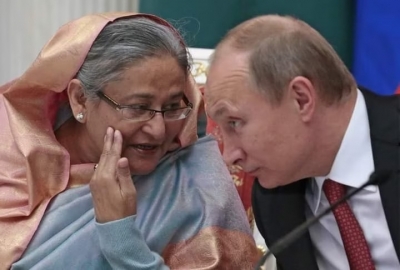By Syed Badrul AhsanNew Delhi, Feb 27: The Ukraine crisis is finally pushing Bangladesh into distinctly uncomfortable territory.In recent days, the Russian authorities have summoned Dhaka’s ambassador in Moscow to the Foreign Ministry to demand an explanation behind Bangladesh’s decision to bar Russian ships from entering its ports.
The Russian move has left Bangladesh worried.Minister of State for Foreign Affairs Shahriar Alam, responding to media queries on the ambassador being summoned by the Moscow authorities, let it be known that Ambassador Kamrul Ahsan was summoned to a meeting where overall Russia-Bangladesh ties formed the basis of the discussions.
The minister’s comments have certainly not allayed concerns in Dhaka about the strains the nation’s foreign policy has come under against the backdrop of the Russia-Ukraine war.
The Russians are miffed that Bangladesh, in line with the sanctions imposed on Russia by the United States and other western nations, has agreed not to allow any of the 69 Russian ships targeted by the sanctions from sailing into Bangladesh waters.In recent weeks, the Russian ship Ursa Major, carrying much needed raw materials for Bangladesh’s Rooppur nuclear power plant, was not allowed into Bangladesh by Dhaka, clearly under pressure from the US authorities.The move did not make President Putin and his government happy.
The upshot was of course the summoning of Bangladesh’s top diplomat to the Foreign Ministry in Moscow.
There can hardly be any denying that when the Bangladesh envoy was summoned by the Moscow authorities, it represented a low in ties between the two countries.
The Russian government pointedly referred to the Bangladesh move against Moscow’s ships as a departure from the traditionally friendly links the two countries have enjoyed since Bengalis launched their War of Liberation from Pakistan in 1971.At the time, the Bangladesh cause gained urgency as well as a geopolitical dimension when the Soviet Union, along with India, identified with the Bengali cause and loudly denounced the atrocities of the Pakistan army in occupied Bangladesh.
While the Indian government of Prime Minister Indira Gandhi waged a political and diplomatic offensive in defence of Bangladesh in the nine months of the Bangladesh war, the Soviet Union reached a deal on friendship and cooperation with India in August 1971.It was seen as a move to thwart any move by other states, particularly the United States (which then was busy using Pakistan as a conduit to its China opening), to come in the way of Delhi-Moscow cooperation vis-a-vis Bangladesh.
The agreement stood the test of time and even as the Pakistani forces faced a battlefield onslaught by the combined India-Bangladesh military command, the Soviet Union, led by the Brezhnev-Kosygin-Podgorny triumvirate, went out of its way to prevent a ceasefire at the United Nations that would curtail the offensive for the emergence of a sovereign Bangladesh.
Soviet support for their cause has been remembered with gratitude by Bangladesh’s people, who witnessed the massive operations undertaken by the Soviet navy in the aftermath of the war to clear Chittagong port – and other ports – of the mines planted during the war.Besides, the Soviet Union, at the request of Bangladesh’s founder-Prime Minister Sheikh Mujibur Rahman, came forth with various other forms of technical and economic assistance to enable Bangladesh recover from the ravages of war.The Rooppur nuclear plant was one area where the new state expected, and received, Soviet support.
This legacy of Moscow-Dhaka ties is today under strains, if not threat.Despite the break-up of the Soviet Union in the early 1990s, Bangladesh maintained its traditional diplomatic and economic ties with the Russian Federation.
Bengali students continued studies in Moscow while new doors were opened for Bangladesh’s business community to engage with Russia.
Against such a backdrop of state-to-state links, the summoning of Dhaka’s ambassador by Russia’s Foreign Ministry marks a sudden and unwelcome deterioration in relations between the two countries.
Unlike India, which through its global clout has adopted a firm stand in defence of its interests even as the Ukraine conflict lingers despite the discomfort felt by the West over Delhi’s position, Bangladesh finds itself in a vulnerable position.
The moves made by the Sheikh Hasina government in recent years to operate a balanced foreign policy are sadly being undermined by western pressure on it to go along with the sanctions regime.
The implications are obvious: much though Dhaka would like to put a spin on the situation arising out of its ambassador being called to the Foreign Ministry in Moscow, relations between Bangladesh and Russia, for the very first time, have gone into a tailspin.Creeping western pressure has done the damage.
Back in 1974, Bangladesh, in critical need of resources after the war and trying to tide over a famine, sought to engage in trade over its jute products with Cuba.The US PL-480 programme came in the way.Bangladesh’s sufferings continued.It was also the year when Tajuddin Ahmad, the socialist Finance Minister in the government of Sheikh Mujibur Rahman, was compelled by the need for Dhaka and Washington to signal a new beginning to their ties to leave the government.
At the time, Dhaka was caught between a rock and a hard place.Decades on, it is a similar condition Bangladesh finds itself in.It is giving politicians and foreign policy experts in Dhaka much headache.And it has left tempers frayed in Moscow.
(The content is being carried under an arrangement with indianarrative.com)
–indianarrative
#Ukraine #echoes #Dhaka #strains #Delhi #Indira Gandhi #Rahman #Rahman #Ali #Washington #China #Delhi #New Delhi #Washington #Moscow #Russia
.






